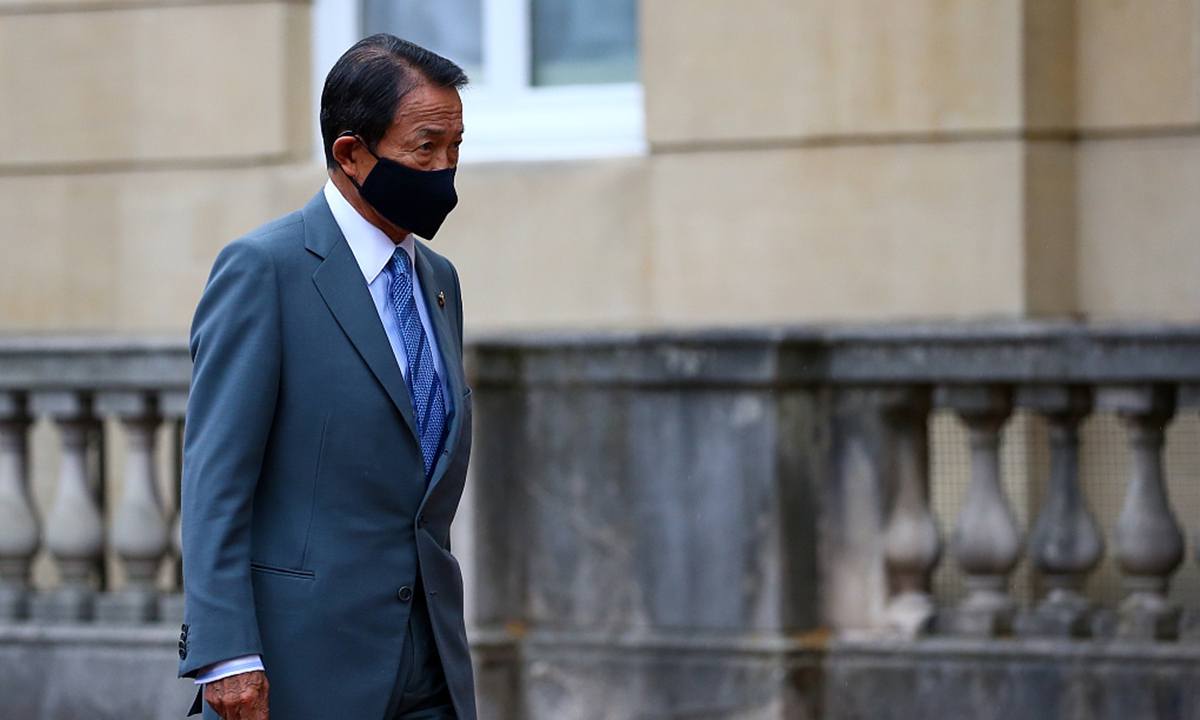Japanese politicians slammed over ‘wrong and dangerous’ remarks on Taiwan, urged to learn lesson from history

Photo: CFP
Japanese Deputy Prime Minister Taro Aso, who recently said Japan would defend the island of Taiwan together with the US if a war erupts cross the Taiwan Straits, was slammed by the Chinese Foreign Ministry as wrong and dangerous, with experts saying that the politician's political manipulation looks pale in the face of national strength.Aso, who is also a cabinet member of Japan's national security council, said on Monday that a Chinese mainland "invasion" of Taiwan could be viewed as a "existential crisis situation," which would allow Tokyo to deploy its Self-Defense Forces (SDF) to exercise collective self-defense, media reported.
Zhao Lijian, Chinese Foreign Ministry spokesperson, said on Tuesday that Aso's remarks are "extremely wrong and dangerous," and gravely undermine the political foundation of China-Japan relations.
Zhao mentioned the history of the Japanese militarists' invasion of China in the 20th century, saying "today's China is not what it was then" but the Japanese have not learned the lessons of history deeply.
We will never allow any country to interfere in the Taiwan question by any means. No one should underestimate the Chinese people's firm determination, firm will and strong ability to safeguard national sovereignty, Zhao said.
Chinese President Xi Jinping expressed strong determination and confidence in reunification and the defeat of secessionists, in his speech at a grand ceremony to mark the centennial of the CPC on July 1.
Senior Japanese officials have recently issued outrageous statements related to the island of Taiwan.
On June 24, Japanese Defense Minister Nobuo Kishi said the island's peace and stability are directly linked with Japan. Also in June, Japanese Vice Defense Jinister Yasuhide Nakayama told a US think tank that it is necessary to protect Taiwan as a "country."
Analysts said Aso's remarks are a reflection of political instability in Japan ahead of House of Representatives elections in autumn. Moreover, China does not mind teaching Japan a lesson to ensure it will not be dominated by extreme politicians, who may think they can provoke China at no cost with the US as its backer.
Zhu Qingxiu, a Japanese studies researcher with the Chinese Academy of Social Sciences, told the Global Times on Tuesday that given that Suga is not a strong figure, factions within his Liberal Democratic Party of Japan (LDP) want to assert their presence ahead of the election. Aso, the former prime minister who briefly held power in 2008, also has political ambitions to run for the LDP presidency.
From the perspective of national strategy, the expert said that Japan, as the US' ally, is trying to seek leverage from both cross-Straits tension and China-US confrontation.
Playing the Taiwan card may bring ties between Japan and the island of Taiwan closer, which also meets the US need in Japan's role under the Indo-Pacific strategy, Zhu said, noting that some may mistakenly assume that the Chinese mainland will tolerate Japan over the Taiwan question.
Some analysts said that despite the pressure from the US, the right to interpret the "existential crisis situation" lies with Japan. If Japan decides to attack China, the People's Liberation Army will have the right to strike back and is able to paralyze the SDF's offensive capability.
The possibility of Japan directly entering a war is low, and logistical support may be the main form, as many provisions of its domestic security law may not be activated, Zhu said.
Katsunobu Kato, Japanese government's top spokesperson, said on Tuesday that he did not know the details of Aso's remarks and declined to comment, Japanese media reported.

